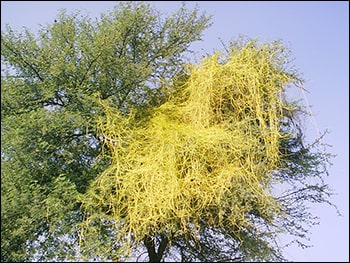Akash Bail (Cassytha Filiformis) - Properties, Benefits & Dosage

Akashbail is commonly known as Amar Bael in Hindi or Cuscuta in English. It is known as an endlessly growing twining herb which grows parasitically on other trees and can grow forever to cover the whole plant.
Once attached to the host plant, Cuscuta can grow for an entire lifespan living parasitically on the host plant without any contact with the soil.
In the traditional system of medicine and natural therapeutics, Cuscuta is a plant of immense medicinal value known for its potent action against infertility, inflammatory conditions and the gastro – intestinal system.
The Latin name of this plant is Cuscuta reflexa or Cassytha filiformis and it belongs to Convolvulaceae family.
COMMON SYNONYMS OF CASSYTHA FILIFORMIS/ CUSCUTA REFLEXA
- English name - Cuscuta or Hell Weed, Devil's gut, Beggar Weed, Scald weed, Dodder of thyme, Dodder plant, Lesser dodder, and Greater dodder
- Hindi name - Akashbel, Amal bel, Kasus, Agas Bel
- Sanskrit name - Akashvalli, Akashbhavana, Akashpavana, Amarvalli, Antravalli, Amaravallari, Khavalli, Nilatara, Vyomavallika
- Bengali name - Akasbel, Swarnalatha
- Marathi Name – Nirmuli, Nirmuli Akashvela
- Assamese name - Honborialoti, Akashilata
- Arabic name - Kasuth, Tikhme kasus
- Telugu name - Lanjasavaramu, Savarapukada, Sitama purgonalu, Sitammapogunulu, Sithammasavaram, Sithamma-pogunulu, Passi teega, Sithamma-savaram
OCCURRENCE
It is very commonly found plant in India which is spread across the varied landscapes of the Indian soil from semi -arid plains to the hill tops up to a height of 3000m.
The stems and branches of the plant are fleshy and bear a few fruits and flowers.
PROPERTIES
- GUNA (characteristics): Picchila (Slimy nature)
- RASA (taste): Kashaya (Astringent), Tikta (Bitter)
- VIPAKA (after taste that develops post digestion): Katu (Pungent)
- VIRYA (potency): Sheet (Cold potency)
SPECIAL ACTIVITY
Many herbs as per Ayurvedic research and knowledge perform special action which is exclusive of their normal properties. The effect of these herbs sometime comes handy in dealing with crucial health condition which may not be dealt with so easily otherwise.
This action performed by certain herbs is known as "Prabhava" in Ayurveda.
So, Cuscuta has a special action by which it acts as a "Stambhana" herb that is it has a very restorative and restrictive action on the body and its various constituents.
Dulcitol and Laurotetanine are considered to be the active chemical compounds found in this plant.
COMMON PROPERTIES OF THE HERB
Cuscuta is a very good herb for managing gastro – intestinal problems. Its general action as an anti – inflammatory agent helps to prevent and control any type of swelling or inflammation in the entire gastro – intestinal tract.
It is used effectively as a purgative and clear out bowel in case of constipation and other similar problems. In case of worm infestations, the strong purgative action of the herb helps to expel worms along with fecal matter in the process of clearing out the colon.
Basically, it is a very effective herb for managing minor belching, flatulence, indigestion, constipation, and intestinal inflammation etc.
In this process it helps to detoxify the liver and reduce its toxic load helping in improving liver functions and bringing them back to normal.
Similarly, it helps to enhance spleen function.
In case of associated digestive troubles like piles or hemorrhoids, its decoction can help to suppress bleeding and regularize bowel habits. Thereby preventing aggravation of symptoms and improvement in the quality of life of that person.
For external use its powder can be mixed with honey and other herbs for local application over open wounds and any kind of skin allergies or rashes.
It is used in various ways to prevent hair fall and improve scalp condition for people having dandruff.
The text also refers to anti – fertility action of the plant which may be attributed to its "Stambhana" properties.
DOSAGE
Whole plant part can be used to prepare its freshly squeezed juice which can be consumed in the dose of 10 – 20 ml.



